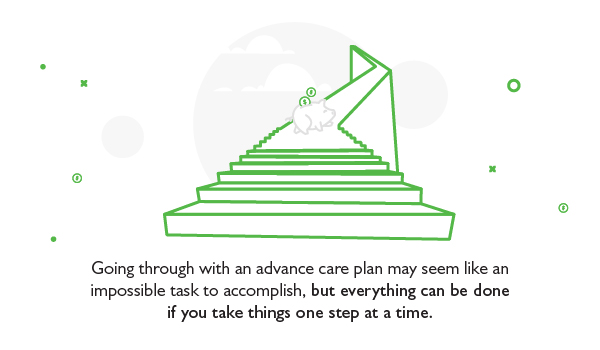For most people, thinking or speaking about you or a loved one passing away is a very tough subject to breach, making it all too easy to avoid planning for it. But this can be a very costly mistake because it leaves room for confusion and difficulty when having to make decisions once that time does come.
Continue reading to discover more about what end of life decisions you may need to make, the information you should have handy when planning should take place, and mistakes to avoid.

What is end of life planning?
End of life planning refers to all the steps a person takes to get their affairs in order and plan for the future. Advance care planning takes care of you. It addresses future decisions regarding medical care, which generally involves a person or their caregiver completing a living will and a healthcare proxy. Legal and estate planning, like a last will and testament or trust, will help determine what will happen to your money, belongings, property and pets.
This process is important because it gives your family the ability to follow through on your desires and directives after you’re gone, which takes the burden of making big decisions on your behalf off their shoulders. It also gives you the power to organize your belongings and arrangements exactly how you’d like.
Let’s take a closer look at exactly what to expect during the planning procedure:
Advance care and estate planning guide
Going through with an advance care plan may seem like an impossible task to accomplish, but everything can be done if you take things one step at a time. Following a list and meticulously tracking your progress is a great way to ensure things are organized and getting checked off.
Prepare your documents
You have the right to decide what actions should be taken after your or a loved one’s passing by filing the necessary documents. According to the National Institute of Aging, these documents include:
- Living will: This legal document, also known as an advance directive, indicates your preferences for medical care or life-sustaining treatment if you can’t communicate. They include palliative care treatments like tube feeding, dialysis, resuscitation, comfort and life care, organ and tissue donation and hospice care.
- Last will and testament: A last will and testament lets you decide how you wish to distribute your assets after death. With this legal document, you will assign beneficiaries to inherit your property and personal belongings. You can also use your will to indicate funeral preferences, especially if you wish to set aside specific money to go toward those expenses.
- Living trust: By creating a living trust, you can manage your assets and create an estate plan while you’re still living and settle who will receive them after you pass away.
- Financial power of attorney: By filling this document out, you choose the person who you wish to act on your behalf to help manage your financial affairs.
- Organ and tissue donation: You can register as an organ donor if you wish to donate your organs or tissues after your death.
- Personal and financial records: Take time to ensure that all of your important papers are ready so all the right people can access them if you have a medical emergency. Also, include any additional information that people may need to know, like your medications or any upcoming bills you must pay.
List your assets
The next step in advance care planning is to document all assets — possessions you will pass down to a beneficiary — to ensure everything is accounted for. Here are some of the most common types of assets:
- Savings and checking accounts.
- Cash or other forms of money.
- Real estate and land.
- Investments, stocks or bonds.
- Retirement accounts.
- Life insurance policies.
- Artwork or collectibles.
- Jewelry or other valuables.
- Corporate assets.
Determine housing
This step isn’t necessary for everyone, especially if this planning process is being completed before there’s an emergency. But if you need to consider eldercare housing, start by deciding what living quarters style you would like. Some frequently chosen options include an assisted living facility, nursing facility or in-home care.
Plan funeral and burial arrangements
We know this step in organizing your affairs is one of the most difficult, but it can be the kindest thing you do for your loved ones. If a memorial service or funeral arrangements aren’t set before they’re absolutely necessary, then your family members will have to plan during an incredibly difficult time. That being said, don’t feel like you have to do this part alone. Having someone you trust help you make these decisions can alleviate some of the burden.
Ensure your pets are taken care of
If you have one or multiple pets, they need to be given a plan, as well. Whether a family member or friend wants to start caring for your beloved animal, or you’re hoping that they will be adopted by a loving family, this needs to be planned and discussed with whoever is helping you get your affairs in order.
What beneficiaries can expect
The executor — the person in charge of keeping everyone up to date with what’s going on — will reach out to all beneficiaries upon the death of a loved one or friend. This person will ensure that all needs are taken care of, bills are paid and belongings are accounted for. Then, assets will be distributed based on the wishes stated in either the will or trust.
When you should start planning
Just like any other plan or preparedness, it’s never too early to start. If advance care planning is a process that you’re nervous about starting, try doing small sections over time to reduce some of the stress of completing every step at once. If you prefer to get your affairs in order in a shorter amount of time, give yourself a few weeks to complete the necessary steps.
The best way to plan is when you’re healthy and able to make all the proper decisions. That means you could start planning right now and be better prepared and at peace that your intentions are laid out and ready.
Ensure a smooth planning process
To make this planning process as smooth as possible, we suggest:
- Start planning now – don’t wait. Even simple steps like adding beneficiaries to checking and savings accounts will ensure a quick transition upon your passing keeping money out of probate.
- Name an executor or health care proxy who you trust completely.
- Don’t get tripped up by every detail of the process. Reach out to professionals for guidance on parts that confuse you.
- Communicate your wishes to your loved ones.
We can’t stress it enough. Communicate your wishes to your family and loved ones. Deciding where your property goes when you’re gone can be stressful; however, it’s important that your family knows what you want to do with your property and money now so there are no surprises later.
End of life planning is a loving act and a gift for those involved because it gives you ease of mind knowing that your affairs are taken care of. It also gives loved ones peace with the fact that everyone is on the same page and comfortably prepared for anything that may happen next. Even so, it may be difficult to know where to start, considering there are many factors to think about and documents that need to be reviewed.

Download this handy guide to get started (PDF)
Bank Midwest can help you get your financial records and documents in line, or answer any questions you may have when you’re ready to begin the planning process. From estate planning services to setting up account beneficiaries, we’re here to help.
Our Trust Services team has years of experience in estate planning, trust administration and serving as executors for estates. Our banking professionals can also help review your accounts to ensure beneficiaries are properly set up for each one.
